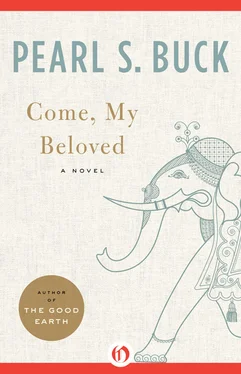What did Leila want him to do now?
He held his eyes tightly shut, surprised at the cry from within himself and even a little frightened. Were there secrets that he did not know? He was a practical man, he had no time to read books, although he used to enjoy listening to Leila tell him about the books she read, and since her death he had opened some of them, seeking to recover the sound of her voice and the vision of her tender face. But without her the pages were dead. Where then could he find out about her now?
“Oh, Leila, honey,” he muttered, teeth clenched, “can’t you break through to me somehow?”
He sat rigid and listening, and he heard unrecognized sounds rising from the streets, high wailing voices speaking unknown tongues, voices as mournful as a dirge, mingled with the sharp cry of the beggars. His loneliness became agony and something as near terror as he could feel lent energy to his soul, searching for lost love. Certain words that had haunted his childhood in the country manse sprang alive in his memory, and he heard his father’s big voice declaiming scriptures from the pulpit.
“It is easier for a camel to pass through The Eye Of The Needle than it is for a rich man to enter The Kingdom of Heaven.”
Why, this was a monstrous thing to remember, for he was a very rich man, and it was not like Leila to remind him of it, but maybe she was doing it because it was the only way she could do it, through his memory. He used to hear those words when he was a small boy, bitterly poor with his family, and none of them had ever seen a rich man and he used to wonder what a rich man did and what he had to eat and to wear, and when he was a rebellious adolescent, he wanted to be a rich man because that was the kind of man his father had hated, a man who could never go to heaven. So maybe this was Leila’s way of telling him that those old words were true and if he wanted to get to heaven where she was he had to do something good now with his money.
He was distracted here by the door opening slowly, inch by inch and he saw Wahdi, smiling at him. He came in on tiptoe, bearing a tea tray, and from his right hand hung an immense basket of white flowers.
“From Govmint, Sahib,” Wahdi said proudly. “A chit, Sahib, telling all.” He set the tray on the table, put down the basket and took from his bosom a large square envelope and gave it to MacArd. Then he stepped back and stood proudly while he waited.
MacArd tore open the heavy paper and drew forth a single sheet embossed with the insignia of the English crown. There was nothing formal, however, in the handwritten message, signed by the Governor-General himself.
Dear Mr. MacArd,
We shall be delighted if you care to have tiffin with us privately either Tuesday or Thursday without other guests, and shall quite understand if you don’t. I have given instructions that you are to see what you like in the city and that reservations are to be made on whatever railroad you choose to travel. We understand the tragic circumstances of your visit and shall await your inclination.
Yours, etc.
MacArd was not deceived. He was not a conceited man, but he was proud. He was invited to the Governor-General’s mansion because he was rich, and wealth was his pedestal.
The incident restored MacArd to himself. He had been shaken, but he must wait. He must think things over, he told himself. Meanwhile here was this invitation.
He pondered it while Wahdi waited majestically, sharing the glory of a master who received flowers from Malabar Point. MacArd’s Scotch blood, inherited two hundred years ago from Scottish ancestors who did not wish to be vassals of Englishmen, tempted him to toy with the idea of refusing the invitation. Courteously as it was worded, it was nevertheless a summons. His prudence conquered. Some time or other he might want to do business in India. It seemed unlikely, but it was within the imagination that railroads might make some day a network around the world, connecting with vast steamship companies. It was an age of expansion. He went to the teakwood desk and wrote a brief note of acceptance. Wahdi received it as an honor and bestowed it upon the waiting messenger outside the door with the air of one conferring gifts.
“We have given the Indian people an extraordinary freedom,” the Governor-General was saying. “In the old days they wouldn’t have thought of criticizing Government. Now, however, British tradition has taken the young Indian intellectuals by storm. We’ve taught them English and they have read our English newspapers and have learned our ways. They read our vigorous and independent editorials, not understanding that in England criticism does not mean disloyalty, and so they criticize us and are disloyal. It began in the time of my predecessor, but it crystallized at the first meeting of the Indian National Congress some few years ago. I hope it may not lead to final rebellion. Lord Lytton felt it very wrong and he passed an Act for controlling the native press, but it was repealed four years later. We English are incurably conscientious and Indians are not used to that.”
A turbaned manservant in a bright scarlet tunic, white trousers and gold belt, waited at his elbow and he helped himself to curry and rice, a pheasant curry delicately seasoned for the English palate.
“Who are the leaders?” MacArd inquired.
There were only the four of them at the long table, and although he faced David, his host and hostess were so distant that he repressed an inclination to raise his voice.
“The young intellectuals, the leftists, as remote from the peasants and the small town and country people as you and I are,” the Governor-General declared.
“Will they be able to persuade the peasants to follow their lead?” MacArd inquired. He disliked curry and took only a little of the dish which the gorgeously garbed Indian servant now held at his left.
“If we keep on educating the Indians in English schools there’s no telling what will become of the Empire,” the Governor-General said frankly. He went on, his disarming smile belying his words and the stiffness of his tall thin frame encased in a white linen suit. “We destroy ourselves, we English. We can’t be proper tyrants. We insist upon our conscience and it makes tyranny impossible.”
David listened, his dark eyes calm. MacArd was proud of his son, sitting there at the vast table at ease, yet with suitable deference in the presence of his elders and of dignity. The Marquess was looking at him, too, and he saw her rather cold blue eyes soften.
“My two sons are in England,” she said suddenly to David. “The elder is only sixteen. They left India when they were five and eight. We kept Ronald later than usual so that Bertie could go with him. I haven’t seen them now for three years.”
“You are going home again in May, my dear,” her husband reminded her.
“I only hope they still remember me, as I am, I mean, and not as a sort of maternal figure,” she said.
“It’s one of the many prices of Empire,” he remarked.
“Ah, but the women pay for it,” she said rather sharply.
MacArd turned to the Governor. “I guess you, too, have missed your sons, though.”
“Yes, certainly,” the Governor-General replied, “yet I yield to my wife. It’s quite true that she misses them more than I do, and also that I have rewards that she has not. English women have a difficult time of it in India, I’m afraid.”
The long elaborate meal drew to its close, and they rose, the Governor-General saying that since his wife was the only woman, they would not linger at table while she sat alone in the drawing room, and so they left the dining room with her.
The palace at Malabar Point was a series of bungalows, the many rooms were large and cool, and the doors opened upon deep verandas shaded by great trees and flowering vines. MacArd had been in the White House, summoned to Washington by the President before he set out for India, but this palace was far more magnificent and nothing was more magnificent than the Governor-General’s own bodyguard. The tall Sikhs, their faces dark under huge and intricate turbans, were splendidly handsome above their scarlet uniforms. MacArd had seen them at the gatehouse, where they stood with their long spears, watchful and waiting. They had none of the servile humility of the crowds on the streets. They were soldiers of Empire, and rejoiced in what they were.
Читать дальше












